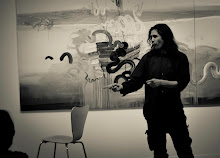Performance Notes - subtlety, and planning a new piece.
I am currently starting on thinking about a new performance piece (which I will preview at Exeter's premiere open mike night 'Taking the Mic' in mid-June), and it is very interesting as I do so, to think about what makes performance thought so compelling, and so fun. The piece I am working on is perhaps a philosophical oddity: It is Spinoza's unfinished Political Treatise. This is a work that appears on the face of it archaic and rooted in the most conventional of Aristotelian/Cicero traditions, where there are three types of pure state; Monarchy, Aristocracy, and Democracy, and a mixed constitution which combines them all. On the face of it the fact is, that Spinoza's essay appears to show exactly how illiberal it is to modern ears (Spinoza eulogizes those who guard convention, restricts his democracy to thirty individuals, and denies women any rights). All of which must be included in any faithful account of the essay, and yet of course if this was all that Spinoza was saying, then I doubt the essay would have had the - albeit intermittent influence - that it has, and would certainly not make good performance.
What really interests me in this piece is not the convention, so much as the realism. Spinoza is, you see in this essay really trying to get to grips with a very difficult problem: How do we make decisions both individually and collectively? And how should we create organisations to enable these decisions and those thoughts to made and acted upon? The point is that what we decide and so how we can act is actually a product of our organisation at institutional level. So that only certain policies and thoughts are possible in certain societies. And Spinoza is cutting very deep here - he really means it. It is not just that societies can only do what they are organised to do, and what is more should only do so (as to step beyond that organisation is to step beyond the society, into anarchy and oppression - hence Spinoza's praise of the tradition). But far more radically Spinoza is clearly saying that the types of organisation impose upon those who are caught up in them, a certain set of problems and certain allowed set of resolutions to those problems. So that how one organises one's world, and how how understands it are reflections of each other, and part of the same basic problem.
The strength of Spinoza's essay is then in its honesty. It accepts this limitation head on, and tries within the imperfection, to create at different levels, different ways to understand or to react to governance. The point being that each of these ultimately limited thoughts ought to be as perfect as it can be it itself. What is more Spinoza clearly leaves open the idea that in any one state, and criss-crossing any one individual, there are many types of organisation, and so many thoughts - none of which have to easily resolve one into the other. A society becomes a conjunction of disparate parts, combined and recombined in differing ways, and these parts involve many individuals, and many parts of the same individual, all attempting at different rhythms and in different ways to comprehend one another.
In short Spinoza is offering us, from the other end of its history as it were, a very perceptive critique of modern liberal societies and their governance. And as part of that picture he has his finger one of the real difficulties to democracy, understood in its purest form - that is as collective decision making. At that level he says it is simply impossible to organise thinking and so action, unless one restricts the numbers involved. He suggests then, that the perfect democracy can only have around thirty citizens in it (a number which, given these individuals must forge between them a collective agreed plan, seems rather large). In addition, Spinoza is clear that the numbers involved in being a democracy ebb and flow, as it becomes easier or harder for groups to form the kind of collective will and thought which a true democracy demands. By implication, then it is very easy to be a democracy (or Spinoza might suggest a mob), that is opposed to something obnoxious, or 'for' something in general (say peace). But it is very difficult to turn that ideal into actual policy.
Now of course in our jaded times perhaps none of this is new, and yet of course in Spinoza's time it was practically unheard of, and unthought. I want then that jar of history to be felt, and to matter. The voice of Spinoza (if I do it right) will clarify thoughts we all have about our world and its promises and policies. And yet there will be something at stake here, which I will certainly end with. Spinoza, at the other of this history (the beginning) still had hope, for all his cynicism, that albeit slowly, things might change, new thoughts might become possible. It is this hope for better in the midst of scepticism which I wish to give the audience as a parting thought, and a lingering refrain. So that the piece should be ultimately uplifting and thought-provoking in the most positive of senses....


No comments:
Post a Comment